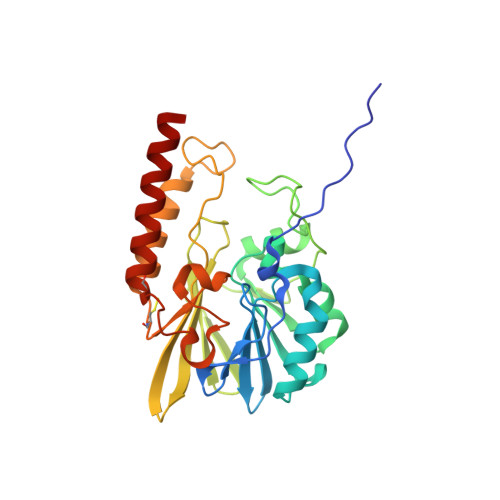Structural and Kinetic Studies of the Potent Inhibition of Metallo-beta-lactamases by 6-Phosphonomethylpyridine-2-carboxylates.
Hinchliffe, P., Tanner, C.A., Krismanich, A.P., Labbe, G., Goodfellow, V.J., Marrone, L., Desoky, A.Y., Calvopina, K., Whittle, E.E., Zeng, F., Avison, M.B., Bols, N.C., Siemann, S., Spencer, J., Dmitrienko, G.I.(2018) Biochemistry 57: 1880-1892
- PubMed: 29485857
- DOI: https://doi.org/10.1021/acs.biochem.7b01299
- Primary Citation of Related Structures:
5HH4, 5HH5, 5HH6 - PubMed Abstract:
There are currently no clinically available inhibitors of metallo-β-lactamases (MBLs), enzymes that hydrolyze β-lactam antibiotics and confer resistance to Gram-negative bacteria. Here we present 6-phosphonomethylpyridine-2-carboxylates (PMPCs) as potent inhibitors of subclass B1 (IMP-1, VIM-2, and NDM-1) and B3 (L1) MBLs. Inhibition followed a competitive, slow-binding model without an isomerization step (IC 50 values of 0.3-7.2 μM; K i values of 0.03-1.5 μM). Minimum inhibitory concentration assays demonstrated potentiation of β-lactam (Meropenem) activity against MBL-producing bacteria, including clinical isolates, at concentrations at which eukaryotic cells remain viable. Crystal structures revealed unprecedented modes of binding of inhibitor to B1 (IMP-1) and B3 (L1) MBLs. In IMP-1, binding does not replace the nucleophilic hydroxide, and the PMPC carboxylate and pyridine nitrogen interact closely (2.3 and 2.7 Å, respectively) with the Zn2 ion of the binuclear metal site. The phosphonate group makes limited interactions but is 2.6 Å from the nucleophilic hydroxide. Furthermore, the presence of a water molecule interacting with the PMPC phosphonate and pyridine N-C2 π-bond, as well as the nucleophilic hydroxide, suggests that the PMPC binds to the MBL active site as its hydrate. Binding is markedly different in L1, with the phosphonate displacing both Zn2, forming a monozinc enzyme, and the nucleophilic hydroxide, while also making multiple interactions with the protein main chain and Zn1. The carboxylate and pyridine nitrogen interact with Ser221 and -223, respectively (3 Å distance). The potency, low toxicity, cellular activity, and amenability to further modification of PMPCs indicate these and similar phosphonate compounds can be further considered for future MBL inhibitor development.
Organizational Affiliation:
School of Cellular & Molecular Medicine , University of Bristol , Bristol BS8 1TD , U.K.

















